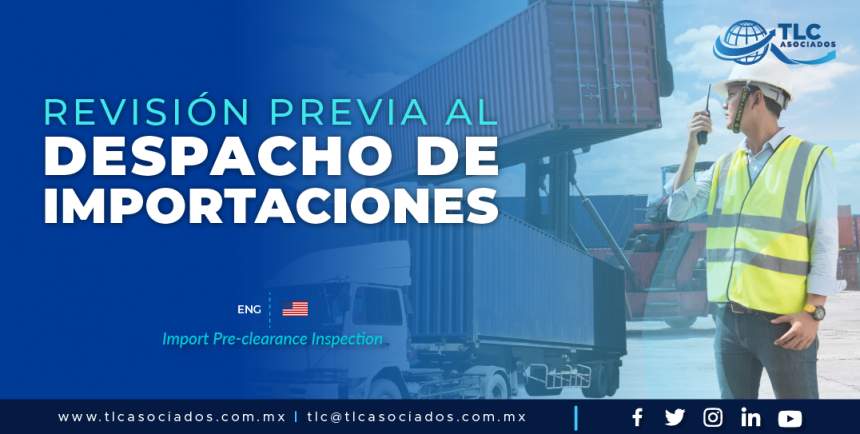
CC3 – Revisión previa al despacho de importaciones/ Import Pre-clearance Inspection
Dentro de la operación aduanera existen actos previos al despacho de mercancías. Éstos son de suma importancia para evitar inconvenientes con las autoridades durante o posterior al despacho. Nos referimos específicamente a la revisión previa de las mercancías, llevada a cabo antes de la elaboración y pago del pedimento de importación.
La legislación nacional establece que la persona autorizada por la autoridad por medio de una patente aduanal conocido como agente aduanal, es la figura idónea para realizar pedimentos a nombre de terceras personas. El artículo 41 de la ley aduanera señala que los agentes aduanales serán los representantes legales de los importadores y exportadores, complementado por el artículo 54 de la misma ley, el cual indica que los agentes aduanales son responsables de la veracidad de la información proporcionada por los importadores y que estos se reflejan en el respectivo pedimento.
Por esta razón, se advierte a los agentes aduanales que soliciten a los importadores que las mercancías sean revisadas antes de realizar el pedimento y el despacho de estas. Esta revisión consiste en verificar descripciones, materia de las cuales está constituida el producto, cantidades de unidad comercial, pesos, valores tanto unitario como total, origen, empaques y embalajes.
La finalidad principal de practicar habitualmente esta revisión es detectar si existen diferencias entre las mercancías físicamente y las facturas y/o packing list. Además, en caso de que existieran diferencias entre ellos, se realizan las correcciones necesarias para que posteriormente se clasifiquen arancelariamente las mismas y con ello determinar el arancel a pagar y las medidas de regulación y restricción no arancelarias que deban cubrir cada una de las mercancías susceptibles a ser importadas a nuestro país.
Aún en nuestros días existen importadores que prefieren omitir este gran proceso, mandando a despacho sus mercancías sin la revisión. Desgraciadamente, esta práctica conlleva un gran índice de incidencias en el despacho y por ende la imposición de multas y créditos fiscales. Por esto mismo, recomendamos que, aunque la operación lleve un poco más de tiempo, se practique esta revisión invariablemente en todas y cada una de sus operaciones con el fin de tener despachos aduaneros confiables y por ende estar más protegidos en cualquiera de las facultades de comprobación que la autoridad nos practique.
“En TLC Asociados, desarrollamos un equipo multidisciplinario de expertos en auditorías y análisis de riesgos para asesorar, implementar estrategias y dar cumplimiento en operaciones de comercio exterior”.
Para más información o comentarios sobre esta publicación contacte a:
División de Capacitación y Calidad
TLC Asociados SC
Prohibida la reproducción parcial o total. Todos los derechos reservados de TLC Asociados, S.C. El contenido del presente artículo no constituye una consulta particular y por lo tanto TLC Asociados, S.C., su equipo y su autor, no asumen responsabilidad alguna de la interpretación o aplicación que el lector o destinatario le pueda dar.
Within customs operation there are acts prior to the release of goods. These are very important in order to avoid inconveniences with the authorities during or after clearance. We are talking specifically about the inspection of the goods prior to the preparation and payment of the import declaration.
The national legislation establishes that the person authorized on behalf of the authority using a customs patent, known as a customs broker, is the suitable figure to carry out pedimentos on behalf of third parties. Article 41 of the customs law states that customs brokers will be the legal representatives of importers and exporters and is complemented by article 54 of the same law, stating that customs brokers are responsible for the veracity of the information provided by importers and that these are reflected in the respective pedimento.
For this reason, customs brokers are advised to ask importers to have their goods inspected before issuing a pedimento and customs clearance. This inspection consists on verifying descriptions, matter of which the product is constituted, amounts of commercial unit, weights, values both unitary and total, origin, and packaging.
The main purpose of carrying out this inspection on a regular basis is to detect whether there are differences between the goods physically and the invoices and/or packing list. In addition, if there are differences between them, the necessary adjustments must be made so that they are subsequently classified and thus determine the tariff to be paid and the non-tariff regulation and restriction measures that must cover each of the goods susceptible to be imported into our country.
Even today, there are importers who would rather skip this process, sending their goods to clearance without an inspection. Unfortunately, this practice leads to a high rate of incidents and therefore the imposition of fines and tax credits. For this reason, we advise that, although the operation takes a little more time, this inspection is to be invariably carried out in each and every one of your operations in order to have reliable customs clearance and therefore be protected in any of the verification faculties the authority performs.
“In TLC Asociados, we develop a multidisciplinary team of experts in audits and risk analysis for consulting, implementing strategies and complying with foreign trade operations”.
For further information or comments regarding this article, please contact:
Training and Quality Division
TLC Asociados SC
A total or partial reproduction is completely prohibited. All rights are reserved to TLC Asociados, S.C. The content of this article is not a consultation; therefore, TLC Asociados S.C., its team and its author do not assume any responsibility for the interpretations or implementations the reader may have.
.
Search
Nuestros servicios
- División de Auditoria Preventiva y de Cumplimiento
- División de Certificaciones OEA-NEEC-CTPAT
- División de Certificación en Materia de IVA/IEPS y Recinto Fiscalizado Estratégico
- División de Blindaje Legal
- División de Consultoría
- División de Lobbying
- Gestoría de Permisos Especiales
- Arquitectura Aduanera
- Revista TLC
- Libros TLC
